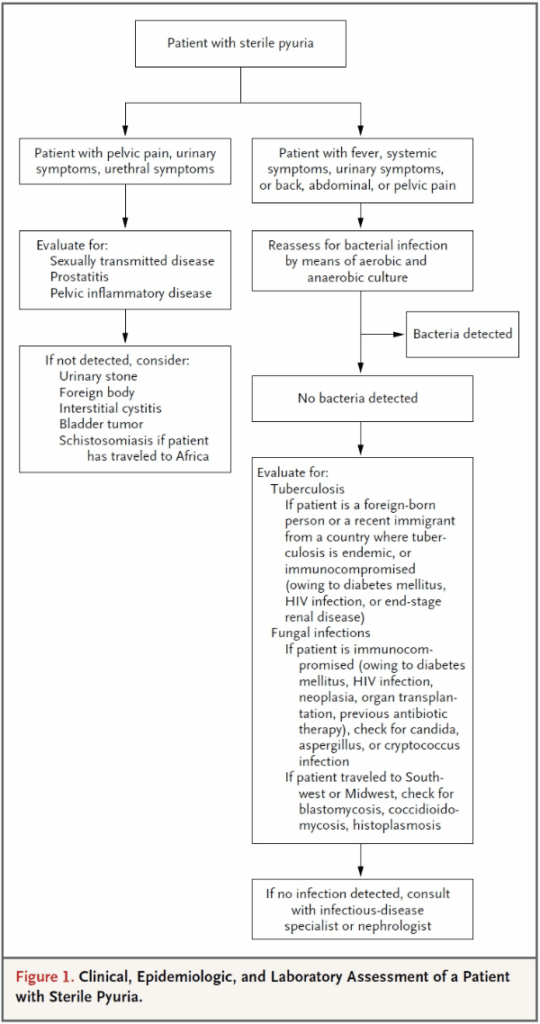Sterile pyuria (무균성 농뇨)
출처 : N Engl J Med 2015;372:1048-54.
Pyuria is defined as the presence of 10 or more white cells per cubic millimeter in a urine specimen, 3 or more white cells per high-power field of unspun urine, a positive result on Gram’s staining of an unspun urine specimen, or a urinary dipstick test that is positive for leukocyte esterase. Sterile pyuria is the persistent finding of white cells in the urine in the absence of bacteria, as determined by means of aerobic laboratory techniques (on a 5% sheepblood agar plate and MacConkey agar plate).
Pyuria는 소변 표본 내에 백혈구가 1세제곱밀리미터당 10개 이상 존재하거나, 원심분리하지 않은 소변의 고배율 현미경 시야당 3개 이상의 백혈구가 관찰되는 경우, 원심분리하지 않은 소변 표본에서 그람염색 검사 결과가 양성인 경우, 또는 소변 검사용 디프스틱에서 백혈구 에스테라아제(leukocyte esterase) 검사 결과가 양성인 경우로 정의됩니다.
Sterile pyuria는 박테리아가 검출되지 않음에도 불구하고 백혈구가 지속적으로 소변에서 관찰되는 상태를 말합니다. 박테리아 부재 여부는 5% 양혈소 혈액 한천 배지와 MacConkey 한천 배지에서의 호기성 배양 검사로 확인합니다.
무균성 농뇨는 세균이 배양되지 않는데도 지속적으로 소변에 백혈구가 보이는 상태를 의미한다.
무균성 농뇨가 발생할 수 있는 몇 가지 원인이 있다.

1. Sexually Transmitted Infections
HSV-2, HPV, gonorrhea, chlamydia, syphilis, mycoplasma, and trichomoniasis
- Gonorrhea and Chlamydia
- Genital Herpes and Herpes Zoster
- HPV and Human Immunodeficiency Virus Infections
2. Other Viral Infections
Viral infections such as adenovirus,21 BK polyomavirus, and cytomegalovirus
3. Genitourinary Tuberculosis
4. Fungal Infections
Candida infections are a common source of urosepsis in hospitalized patients, especially those who are immunocompromised.
Candida albicans is the most prevalent species; however, C. glabrata, C. tropicalis, C. krusei, and other candida species can also cause infection.
5. Parasitic Infections
Trichomonas vaginalis is one of the most common human parasitic infections in the United States and the most prevalent nonviral sexually transmitted infection.
An estimated 119 million people in the world are infected with Schistosoma haematobium.Radiographic studies may show calcification of the bladder wall or ureter
6. Inflammatory and Autoimmune Conditions
Kawasaki’s disease, systemic lupus erythematosus
In addition, analgesic nephropathy can cause sterile pyuria in association with chronic interstitial nephritis and renal papillary necrosis.
7. Inflammation outside the Urinary Tract and Other Urologic Conditions
One study involving 210 patients who were hospitalized for infections outside the urinary tract (e.g., pneumonia, bacterial septicemia, intraabdominal infection, enteritis, and female genital tract infections) identified 31 patients (15%) with sterile pyuria. In addition, pyuria may be associated with radiation cystitis, urinary stones, foreign bodies, stents, transvaginal mesh, urinary fistulae, polycystic kidney disease, renal-transplant rejection, and intrinsic renal disease.
* 무균성 농뇨 환자의 접근 방법

* 무균성 농뇨 환자의 원인별 진단과 치료
